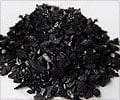The petroleum-based plastic that has become an integral part of our daily lives these days; but the damage it causes to the environment is immense. Now, a new study by University of Missouri (MU) researchers has suggested that it might be possible to replace these 'bad plastics' with a 'greener' alternative - plastic from plants. This new form of non-polluting, renewable plastic can significantly reduce our personal carbon footprints on the earth.
Reducing the carbon footprint and the dependence on foreign oil, this new 'green' alternative may also provide an additional cash crop for farmers."Making plastics from plants is not a new idea," said Brian Mooney, research assistant professor of biochemistry with the MU Interdisciplinary Plant Group.
"Plastics made from plant starch and soy protein have been used as an alternative to petroleum-based plastics for a while. What is relatively new - and exciting - is the idea of using plants to actually grow plastics," he added.
By employing a number of modern molecular techniques, scientists are able to introduce three bacterial enzymes into the model plant Arabidopsis thaliana.
When combined with two enzymes from the plant, an organic polymer is produced.
The polymer, known as polyhdroxybutyrate-co-polyhydroxyvalerate, or PHBV, is a flexible and moldable plastic that can be used to produce a wide range of products, such as grocery bags, soda bottles, disposable razors and flatware.
Advertisement
"Of the two plant enzymes that supply the chemical precursors for PHBV, one is produced in the mitochondria. Recently, we've successfully modified plants so that this enzyme is diverted to the chloroplast, which has been defined as the best place in the plant to produce PHBV," said Mooney.
Advertisement
These recent advances potentially remove two of the remaining technological hurdles limiting the ability of companies from turning acres of weeds into plastic factories.
The next step, according to Mooney, is to see if the technique works in 'real' plants, such as switchgrass.
Source-ANI
TAN/L











